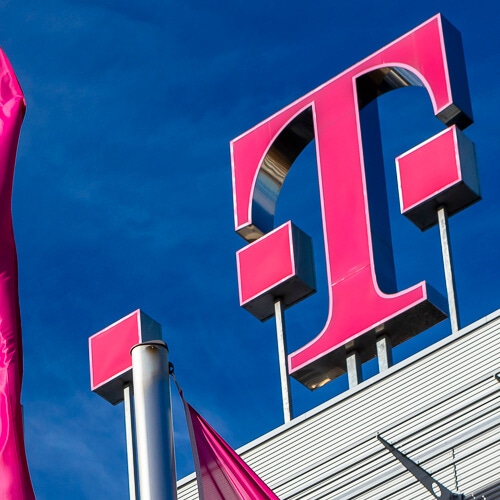Deutsche Telekom's shrinking IT unit gets another rejig
Having reportedly failed to land a buyer for T-Systems, the German operator goes in for another bout of restructuring.

Deutsche Telekom's ageing IT unit is like one of those geriatric rock bands that has slowly lost members to sickness, death or retirement and struggles to play more fashionable tunes. So knackered does it look that Deutsche Telekom reportedly put the whole back catalog up for sale last year. No deal materialized, hence the latest rejig.
Figure 2:  (Source: Deutsche Telekom)
(Source: Deutsche Telekom)
It involves carving off a part of T-Systems responsible for multimedia solutions (MMS). This and its 1,700 employees will be absorbed into Telekom Deutschland, the main telecom business in Germany, which has already hoovered up various T-Systems assets before. Under Telekom Deutschland's management, MMS will carry on supporting public-sector and business customers in Germany on their digital strategies, whatever those entail.
The rest of T-Systems, which employed 28,187 people at the end of June, has a less obvious future. Noting that 85% of its revenues now come from cloud services and digital solutions (whatever these are), Deutsche Telekom has rather cryptically said the business will be positioned henceforth as a "vertically focused IT service provider for advisory services, cloud services and digital solutions."
Figure 1: Sales and staff numbers at T-Systems  (Source: Deutsche Telekom)
(Source: Deutsche Telekom)
It sounds as if further cost-cutting and catalog shrinkage could lie ahead as products that do not fall into these areas are scrapped. Deutsche Telekom had outlined some of its intentions in its earnings report for the second quarter, saying it would set up four distinct T-Systems units – advisory, cloud services, digital and security – and target four industries where customers are presumably keen (those being automotive, healthcare, the public sector and public transport). The T-Systems "transformation program" would also continue, said the operator, using what many will read as a euphemism for cuts.
The doubt is over the strength and appeal of the newer stuff. If it were seriously good, why have attempts to sell T-Systems failed (according to multiple reports this year)? Of course, now is not a great time to be signing deals, unless a company is willing to sell assets for a pittance. But the performance of the business has not looked encouraging.
Terminal decline
Much like other telcos with IT subsidiaries, Deutsche Telekom has two sales problems. The first is that its older products are in terminal decline and taking a long time to finally expire, gobbling up resources while they remain on life support. The second is that sales of whizzy new services to do with the cloud and "digital" things are not growing fast enough to provide pain relief.
Over a ten-year period, T-Systems has consequently more than halved in size. Back in 2012, it reported more than €10 billion (US$10.1 billion) in revenues and had a workforce of more than 52,000 people, according to Deutsche Telekom's relevant annual report. Last year, its sales were down to just €4 billion ($4 billion) and there were around 28,000 people on the payroll.
In fairness, some business activities have shifted to other parts of the group, and employees have moved with them. But many have simply been let go. Outside the US, it should be noted, divestitures and savings initiatives have reduced Deutsche Telekom's workforce by around 47,000 employees since 2013.
Want to know more about 5G? Check out our dedicated 5G content channel here on Light Reading.
Increasingly, too, the cloud seems to have T-Systems acting as a support band for much larger, younger and more successful US companies. Its most recent earnings report points out that it has "agreed partnerships with leading cloud service providers (e.g., Amazon, Google, and Microsoft), so as to be able to offer our customers an even broader and more flexible range of cloud solutions."
Why would a customer go through T-Systems instead of dealing with those public clouds directly? The answer seems to be that Deutsche Telekom can throw in some extra goodies – a guarantee, for instance, that data will be stored securely at facilities in Germany and not in some Oregonian server rack under the nose of US spies. It can also function as an auxiliary between a customer and the public clouds, ensuring the former's workloads can slot easily into different cloud environments.
A part-Chinese cloud
None of this sounds very sexy, though, and European companies including Deutsche Telekom have been losing market share in the region when they try to compete against the public clouds, according to Synergy Research Group. Since 2017, the combined share of European cloud providers has dropped from just 27% to just 13%, said the market research company in September.
Deutsche Telekom's heavy reliance on Huawei, a controversial Chinese vendor, has conceivably not helped. Open Telekom Cloud, the operator's alternative to AWS, Google Cloud and Microsoft Azure, was built with Huawei's help and technology, as noted in Deutsche Telekom's annual report for 2016.
Given the backlash against Huawei in the telecom market, and all the gnashing of teeth about information falling into the wrong hands, what major enterprise or public-sector body would want a Chinese vendor of dubious reputation anywhere near its IT systems? Unsurprisingly, Deutsche Telekom was careful to avoid a single mention of Huawei in its last annual report.
If there is a positive, it is that T-Systems looks more profitable now than it did back in 2012, when revenues were €6 billion ($6 billion) higher. Back then, it generated an operating profit of just €110 million ($111 million) for a margin of 1.1%. Last year, the figure was €151 million ($152 million), putting the margin at 3.8%. For observers noting an operating margin of 30% at AWS last year, that improvement may be a very small consolation.
Related posts:
— Iain Morris, International Editor, Light Reading
Read more about:
EuropeAbout the Author(s)
You May Also Like



.jpg?width=300&auto=webp&quality=80&disable=upscale)








